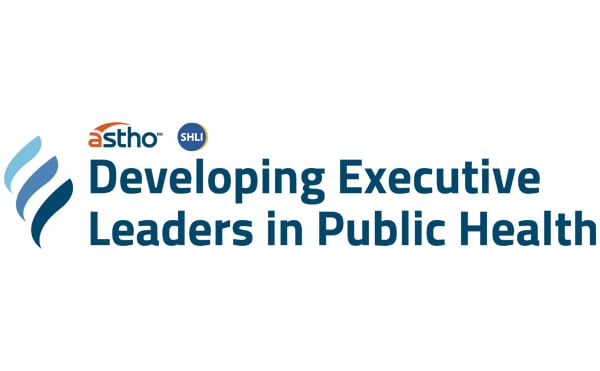Exploring the Effect of Public Health Crises on Health Equity Leadership
February 27, 2023 | ASTHO Staff
 Health equity is at the center of the Diverse Executives Leading in Public Health (DELPH) program. ASTHO, in partnership with the Morehouse School of Medicine’s Satcher Health Leadership Institute, challenges DELPH scholars to reflect on what it takes to bring this equity work to their own health departments.
Health equity is at the center of the Diverse Executives Leading in Public Health (DELPH) program. ASTHO, in partnership with the Morehouse School of Medicine’s Satcher Health Leadership Institute, challenges DELPH scholars to reflect on what it takes to bring this equity work to their own health departments.
Given the unique circumstances presented over the past few years by the COVID-19 pandemic, ASTHO reached out to a few of our DELPH scholars to discuss what type of leader this moment in public health requires and their experience in health equity leadership during the pandemic. In this blog post, DELPH scholars Ryan Natividad, Sounivone Phanthavong, Krystle White, and Felicia Veasey contemplate whether the times produce the leader or the leader produces the times. This conversation continues a discussion held with the same scholars in a post about elevating community voices through health equity leadership.
KRYSTLE WHITE:
I recently found a quote from Joaquin de Castro, co-founder of MindReform, that stated, “Great leadership arises through the proper action at the proper time,” and I couldn’t agree more. When it comes to being a public health leader and, more importantly, a health equity leader, what is impacting our community the most shapes our efforts.
In a picture-perfect world, certain health crisis interventions would not exist if it wasn’t for health leaders responding with innovative tools to combat the issue. Without the severe impact of the COVID-19 pandemic, the way we responded to certain underserved communities would not have been as robust and impactful.
The pandemic, along with the layered issue of medical mistrust, forced us to be innovative in our approach when attempting to remedy social determinants of health for certain communities where the pandemic further exacerbated these engrained issues. We had to adjust or redevelop local policies and interventions during this time, as what had worked in the past no longer served those impacted. Effective leaders are tried and tested and can push past difficulties and power forward during some of the tensest times in our history.
FELICIA VEASEY:
Who I am as a leader now versus who I was before COVID-19 are different. Three years ago, I would have never thought that I could or would serve as the COVID-19 Operations Director for 11 counties while maintaining my role as the community systems director. However, seeing the need of the community, its correlation to chronic diseases, and those most impacted by COVID-19, fueled my desire to lead. I saw the need to lead, in part to speak up for those not around the table making decisions. The pandemic stretched me professionally and spiritually. The ever-changing COVID-19 environment birthed abilities and skills that I didn’t know I possessed.
RYAN NATIVIDAD:
“Extraordinary times call for extraordinary measures. We saw a need that needed to be filled, and we stepped in to help.” This Benet Wilson quote captures the ardent spirit of my current millennial generation. Among previous generations, millennials are considered the unluckiest generation after surviving various recessions (i.e., the dot-com bubble recession, the Great Recession, and the COVID-19 recession) and powering through the COVID-19 pandemic. Due to these circumstances, I feel that millennials are the “Resilient Generation.” Whatever we endure, we keep our heads high and work towards the future we want.
SOUNIVONE PHANTHAVONG:
Leaders must be responsive to the environment and conditions in which they are operating. Promoting health equity requires not only an understanding of the structural, social, political, and environmental conditions of health but also the root causes of such conditions. Even with these understandings, well-structured plans are still subject to infinite variables. A leader should be ready to adapt to changes and address emerging needs. A leader working with the times considers what is needed, works towards growth, leverages strengths, identifies opportunities for improvement, provides responsive support, and builds capacity. A leader should aid in addressing conditions that impact the time it takes to make progress towards achieving health equity.
A leader who aims to produce the times may face unanticipated challenges that will hinder their ability to achieve their desired outcomes. Systemic issues have limited health equity, with many issues rooted in historical and intentional oppression. These systemic issues require systemic changes. A health equity leader must prepare to work within these systemic conditions to produce macro- and micro-level outcomes.
Related Content

Developing Executive Leaders in Public Health
ASTHO and the Satcher Health Leadership Institute at Morehouse School of Medicine began the DELPH program in 2021 with funding from CDC’s Center for State, Tribal, Local, and Territorial Support. The program recruits mid-to-senior-level governmental public health professionals from underrepresented groups in public health leadership to support learning, networking, and professional development opportunities to grow a diverse cohort of leaders nationwide.